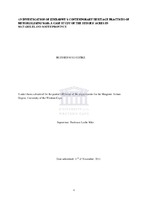An investigation of Zimbabwe's contemporary heritage practices of memorializing war : a case study of the Heroes' Acres in Matabeleland South Province
Abstract
The study through the topic: An investigation of Zimbabwe's contemporary heritage practices of memorializing war: A case study of the Heroes' Acres in Matabeleland South Province focuses on post liberation war memorialisation and management in the post-colonial state of Zimbabwe. It analyses the emergence and management of war memorials and shrines in the form of heroes' acres, in the province of Matabeleland South in Zimbabwe from 1988 to 2010. Zimbabwe attained independence in 1980 after a long protracted war waged by two guerrilla movements against the unilaterally declared independent state of Rhodesia led by Ian Smith. Post-1980, ZANU (PF) became the dominant political party in the new state now renamed Zimbabwe. A national memorialisation structure was established soon after independence; charged with ensuring a befitting memorialisation of the war of liberation. Post-independence political contradictions between the parties notwithstanding, the results of the 1980 election showed an ethnicized landscape, a trajectory that has been at the centre of the national political discourse. Political disturbances in the Matabeleland and Midlands provinces became one of the most important and interesting historical issues that unsettled the nation in respect of memorialisation. Against this background, this research proposes to assess how political actors contributed to the issue of memorializing a war in post-1980 Zimbabwe. Using the central question which arose from a critique of Zimbabwe's memorialisation structure as a graded one, in which the local site subordinates the national, the research aims to examine whether the shifts in the political and management spheres of the heroes acres as represented by the inclusive government currently governing the country and the transferring of management duties of heroes acres to the National Museums and Monuments of Zimbabwe, has managed to challenge the claim made above. By embarking on this work, the research aims to examine whether the local memorial sites actually act as mere subordinates in a deliberate graded structure to the national shrine represented by the National Heroes' Acre in Harare, within the politics of memorialisation.

